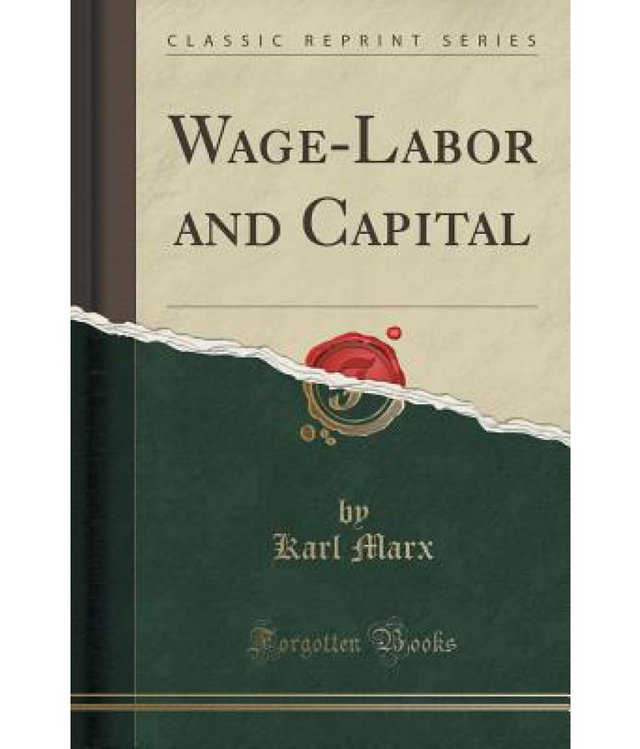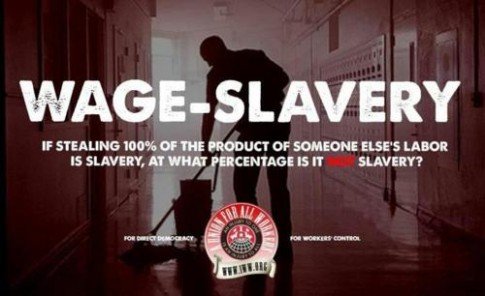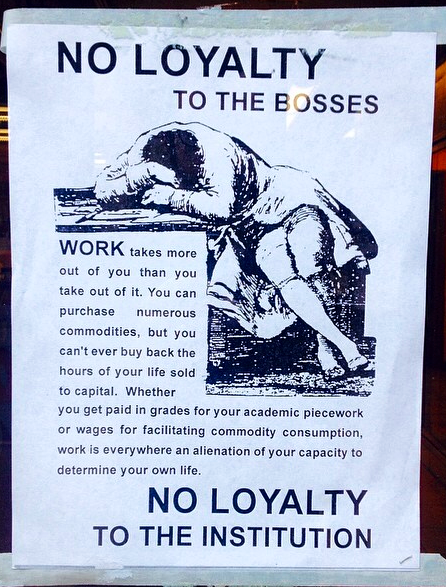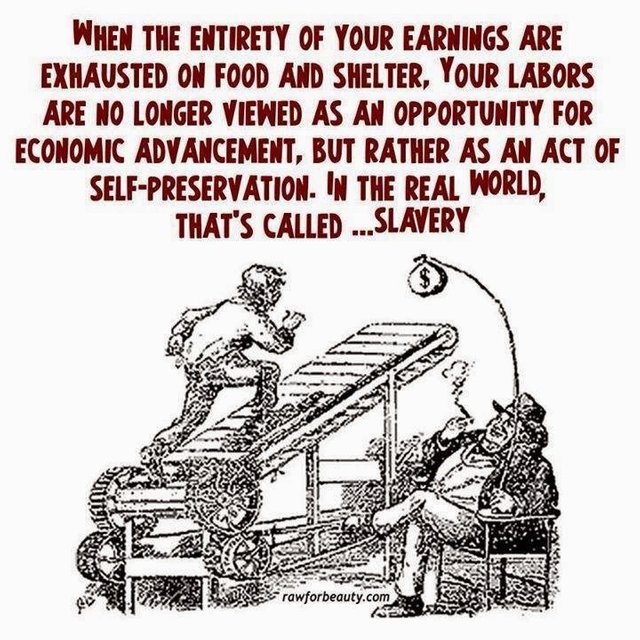Critiques of capitalism are often ignored or covered up. Some Steemians have gone as far as saying there are none.
The Value of Labor
In capitalism the value of labor can be defined as how much somebody is willing to pay for labor. In capitalism prices continually rise and fall, making a true value for an item impossible. Long ago it was decided that the value of an item was the amount of labor it took to create it. All items are directly tied to human labor. When efficiency grew the amount of the item grew, changing the price.
This introduced a contradiction. Labor itself is a commodity on the capitalist markets and the value is the amount an owner would pay a worker to do said labor. Imagine we have a worker who works 12 hours a day and is paid 100 dollars for that labor. Every 12 hours he produces a product worth 450 dollars out of materials worth $250. His labor would be valued at 100 dollars every 12 hours. However, he produces $200 dollars of value every 12 hours. This means in reality 6 hours of his labor is worth $100 and unless 6 equals 12 we have a contradiction. In this situation, the laborer labors 6 hours for himself and 6 hours for his boss.
How The Capitalist Value of Labor Decided
Most workman think they sell labor to the capitalist, that is wrong. What is actually sold is labor-power. This store of labor power (the worker) is used by the capitalist at the times of his choosing to do work on other commodities. Labor-power, like all things in a capitalist society, has a value. Once the commodity is made the worker has no further say in its use. The labor-power is simply a tool to be bought by a capitalist and used, it just happens to have flesh and blood. The worker simply auctions off his labor, his very self, to the highest bidder.
Since labor-power is simply another commodity in a capitalist system, it is sold by supply and demand. Both the capitalist class and the working class fight within themselves, the capitalist to get the cheapest labor-power and the working class is simply to survive. The more supply the more the suppliers (workers) must infight to survive and the less the capitalists must infight. This causes the workers to get even less and the capitalists to gain more from their labor-power.
In a capitalist economy prices fluctuate often. This, however, is always around the cost of production. As supply increases price is pushed down and then resources are moved out of manufacturing that item. This eventually results in too few people producing this item and the opposite happens. This means the average price is the real value of the object, the cost of production.
Now we arrive at the cost of production of labor-power. The cost of production of a worker is what it takes to attain the skill level required for the job. Most jobs exist at the bare minimum of requirements, only the body itself necessary. A capitalist must replace a worker after his time of use has expired in the same way as a machine. This means he must give the worker enough to survive, this was once called the minimum wage. The name has since changed to living wage as the minimum wage in many countries is lower than the living wage. This does not always hold true. Many workers are starving because the wage they receive is not enough to survive and many are getting more than the bare minimum. This increases the population, increasing the amount of workers. When the workers are given too much (as is the case when the demand is too high), their numbers increase and increase the supply. This keeps the wages and population in check.
The definition of wage slavery:
“a person who works for a wage, especially with total and immediate dependency on the income derived from such labor.” - dictionary.com
Most of this is shortened and mixed arguments from Karl Marx himself, which form the fundamentals of Leftist ideals.





I'm very excited to see what sort of responses will come from "an"-caps to this article. Great stuff!
Downvoting a post can decrease pending rewards and make it less visible. Common reasons:
Submit
""""""""""""""an"""""""""""-caps
Downvoting a post can decrease pending rewards and make it less visible. Common reasons:
Submit
Your labor is worth what your labor is worth. If you don't like the value of your labor, you can seek to increase it (training, education, etc.) or use it for yourself instead of auctioning it off (though this presents its own set of challenges and is not a guarantee of being better off). If you artificially force a higher cost for that labor then you end up pushing the price of the product or service being produced beyond what people are willing to pay (at the very least, you decrease demand). Increasing wages increases costs which increases prices. There's not a simple one to one ratio here as there are a variety of other cost, supply and demand issues but artificial manipulation of prices never works out well. It's been tried many, many times. In a highly successful economy, those at the "wage slavery" side of the equation are minimized which is all that you can ever hope to do. Fixing prices is not the way to a highly successful economy. A free market is the way to a highly successful economy though in the U.S. we are far from having such a market. Having said that, very few workers, if any, are starving.
Downvoting a post can decrease pending rewards and make it less visible. Common reasons:
Submit
It seems as though you didn't read his article, as at no point did he mention price fixing, artificial manipulation of prices. He simply broke down how labor works, wherein the worker MUST be producing more than they are being compensated for, otherwise the capitalist would not "hire" them. This is one of the key flaws in capitalism, and what separates it from the free market: Those with capital will always increase their capital by extracting value from those without.
Remember that in a world free of violent control by the state, corporations would not exist, and capitalists would actually have to accept responsibility & liability for their actions, thus changing the paradigm in many ways. The only way to get to a sustainable system, however, is to move away from the artificial competition created by the illusion of scarcity of the necessities of life, and humans remembering that they are not separate from each other, any of the other life on Earth, or the Earth itself.
Finally, if you don't think many workers are starving, apparently you've never heard of places like India, China, Korea, Vietnam, Mexico, et al. Even on the lands occupied by the United States Corporation, most homeless have jobs, and most who receive "SNAP" also have jobs, neither group receiving enough to survive. Personally, I see the entire idea of "jobs/work" for the trap that it is, as these things in no way produce the necessities of life, and the system that creates workers is designed specifically to create people who cannot survive without its mechanisms.
Downvoting a post can decrease pending rewards and make it less visible. Common reasons:
Submit
Sure I read it. A minimum/living wage is typically a minimum price set by government on labor. I was addressing the minimum wage and defending capitalism which has nothing to do with corporations:
Capitalism is "an economic and political system in which a country's trade and industry are controlled by private owners for profit, rather than by the state." Capitalism IS about free markets. Corporations are legal entities and I agree that they are given too many protections and often have anti-competitive collusive arrangements with the government but corporations are not a necessary component of capitalism.
Of course capitalists make a profit. If they did not the implication is that the value they provide is nothing which of course is untrue. Whether they make a "profit" or pay themselves a "wage" really doesn't change the dynamic. A share of the money created from the widgets produced is always going to go the person who owns the business, with or without corporations. The owner gets to decide how much that is within the bounds of how cheap he can purchase the labor and other things that he needs to run his business. A business owner (corporation or not) always tries to minimize costs, including labor.
It's true that all wage paying jobs do not compensate sufficiently for all the necessities of life but who said that should be the case? Should a part time McDonald's worker make enough money to pay for a place to live? If so, who enforces that? How many hours should one have to work to provide the necessities of life? If such a wage is enforced, what happens when the price of McDonald's rises to the point that no one buys it any more? Replace 'job at McDonald's' with any low skill or entry level job. Eliminating corporate protections won't change that. The price labor is worth is still largely a supply and demand issue. If there were not a lot of low skilled or entry level workers competing for those jobs, corporations would be forced to increase their wages. You can get rid of "corporations" as such and that dynamic would not necessarily change.
Yes, anywhere in the world you go there are probably some people starving somewhere. In general though, the more free the markets the less starvation. In the U.S., with or without welfare, very few people would actually starve. However, the U.S. is one of only a few countries that produces more food than it consumes. This is not true of very many countries and when you have to import food, costs are going to rise.
Downvoting a post can decrease pending rewards and make it less visible. Common reasons:
Submit
or you could literally get what you produce
they must always profit to exist...... this means that the price is always pushed higher than what is necessary
and automation is not a bad thing....... it helps humanity produce more....... only in capitalism where you starve if your job is automated is it bad for anyone
Downvoting a post can decrease pending rewards and make it less visible. Common reasons:
Submit
In capitalism, automation can be bad for some people in the short run but it is not a bad thing in the long run. But if production is automated, who gets to keep what is produced? In an anarchy, how would you make it happen? How is keeping what you produce even necessarily advantageous? If I work in a factory that assembles things what is it exactly that I get to keep? I work on a team that develops custom software for another corporate customer. I don't want to keep it, particularly just the parts that I write. It would be useless to me. Capitalists take some off the top for providing the services that they provide. Whether you think the amount is "fair" or not is a different argument but if you divide it out among all the employees of a company it doesn't usually amount to much. Certainly not the difference between starving or not. Marxism and capitalism have both been tried in the real world and capitalism has done much better. Personally, I don't see how many of the advancements made in the world would ever have happened without someone providing capital. This was true even before capitalism was a thing. I mean you can try to get a bunch of people to band together and build a factory to build cars with no one getting paid until that first car is produced but good luck making that work.
Downvoting a post can decrease pending rewards and make it less visible. Common reasons:
Submit
I know what Marxism is. The theory of Karl Marx basically says that because of economic disparity there will be a revolution that leads to socialism and ultimately to communism. You could argue that it is predictive vs. advocative but either way it has been a failure and those that have tried to force implementation of communism have failed too because people do not want it, are not motivated by it, and otherwise do not respond well to it in the long run. Marxism is not simply "the act of bashing capitalism". At least not the Marxism espoused by Karl Marx.
Wanting to help humanity is a noble goal but it is typically not as immediate as wanting to make a profit or simply wanting to improve the life of yourself and your family. People will naturally put helping their children above helping all of humanity. Some people are selfish but others simply have an enlightened self interest. Education is one thing, changing human nature is quite another. There's nothing stopping people from helping humanity right now. Also, just because someone wants to help humanity doesn't mean they want to do it the way you describe. Given that I have limited resources I will seek to use those resources in an intelligent way. If I need a car, I want to buy a good car, not a crappy one. My resources will go towards those who make the better car in the price range I am willing and able to tolerate. Having all car makers receive my resources equally does not benefit me nor encourage innovation and improvement. People don't want the results of Marxism because, among other things, it takes away choice.
Capitalism provides the most efficient economic model and efficient economic models make for less poverty than inefficient ones. Corporatism is a problem but it is a problem that exists because of strong central governments, not because of capitalism. Technological advancements have come more quickly when capitalism is present. Poverty is less prevalent where capitalism is present. Technology will ultimately end poverty but we are not there yet.
Downvoting a post can decrease pending rewards and make it less visible. Common reasons:
Submit
lmao is right. So what new things has this group invented? What new innovations? New medicines developed? Maybe they have launched a couple of satellites for their own private communications network? What factories do they have? They make all their own stuff? How does this scale to 6 billion people? If you want a small scale (yes, 10s of thousands is small scale) very simple agricultural or nature based lifestyle than this is great, go out and do it, nobody is stopping you. But if you want that laptop you are using to type right now, I bet one is not being produced there.
But hey, get government out of the way and see what develops. I bet you'll see something more resembling capitalism than marxism.
Downvoting a post can decrease pending rewards and make it less visible. Common reasons:
Submit
You can't keep the 'equivalent' unless someone gives you the 'equivalent' and who gets to decide what 'equivalent' is and who gives me whatever I wish?
Why would or should I, as a member of society, give to some factory workers who produce cars when I may not want a car but something else instead? Who gets to decide how the product of my labor is distributed to others? This is one of the reasons why this economics of this theory are so inefficient. Resources are wasted producing thing that at the end of the day people may not even want or need or may be complete crap. Competition is a large part of what leads to improvement. If the masses are forced to prefund everything then where is the incentive to innovate and make a quality product?
Most importantly, how do you implement all this without a strong government to enforce and decide things? If you can get the masses to voluntarily fund what you are doing then go for it.
Marxism IS a theory that advocates communism which has been proven to work much more poorly than capitalism (even the flawed kind we have in the U.S.) on multiple occasions.
Downvoting a post can decrease pending rewards and make it less visible. Common reasons:
Submit
Deserve has nothing to do with it. I have to be willing to buy it and someone else has to be willing to sell it.
Downvoting a post can decrease pending rewards and make it less visible. Common reasons:
Submit
you keep the equivalent of what you produce....... in any form you wish
marxism is not a theory itself it is a bash of capitalism tard
"without someone providing capital." the masses
"I mean you can try to get a bunch of people to band together and build a factory to build cars with no one getting paid until that first car is produced but good luck making that work."
they get the equivalent of their labor done building the factor back from the society while building it........
Downvoting a post can decrease pending rewards and make it less visible. Common reasons:
Submit
"If the masses are forced to prefund everything then where is the incentive to innovate and make a quality product?"
because they want to produce something to help humanity not just to make money....... if you are forced to make money to help humanity you cant help humanity effectivly
Downvoting a post can decrease pending rewards and make it less visible. Common reasons:
Submit
"Marxism IS a theory that advocates communism"
wrong thats Marxism-Leninism
Marxism is just the act of bashing capitalism
you dont need a government to allocate resources....... it could be done easily with a currency of work vouchers......
Downvoting a post can decrease pending rewards and make it less visible. Common reasons:
Submit
look what I found lmao
https://steemit.com/philosophy/@kennyskitchen/the-rainbow-gathering-5-decades-of-beta-testing-anarchist-society-part-1
Downvoting a post can decrease pending rewards and make it less visible. Common reasons:
Submit
thanks I saw it on my phone but couldn't reply lol
Downvoting a post can decrease pending rewards and make it less visible. Common reasons:
Submit
I don't know why you see this as a contradiction. The laborer rents the job opportunity from the employer and in this case it costs the laborer $100. This is a common idea, I'm surprised you think it is some kind of secret. Many industries has associated costs, such as a taxi driver paying for a license or a freelancer renting the equipment to perform a job, such a plant hire or whatever. You also do not factor in any inefficiency or depreciation of value or ability, but of course it's a simple example.
More interesting is whether or not this can be justified or made fair by altering the rates. For example, say the employer only took a 20% cut instead of a 50% cut, would that be reasonable? What about 5%? Do you see my point?
Downvoting a post can decrease pending rewards and make it less visible. Common reasons:
Submit
More interesting is whether or not this can be justified or made fair by altering the rates. For example, say the employer only took a 20% cut instead of a 50% cut, would that be reasonable? What about 5%? Do you see my point?
0%
so because somebody has money they deserve to take from somebody who doesnt........ hitler is cool amiright?
Downvoting a post can decrease pending rewards and make it less visible. Common reasons:
Submit
So you can come to my house, demand my lawnmower, mow some lawns and take the entire takings, leaving me with my machinery at the end of the day and no share in the profit despite the machinery belonging to me?
Downvoting a post can decrease pending rewards and make it less visible. Common reasons:
Submit
no private property in leftism
why make a million lawn mowers for a million people when only 10k are needed....... you are literally taking resources and letting them sit there doing nothing....... that is directly hurting humanity
Downvoting a post can decrease pending rewards and make it less visible. Common reasons:
Submit
https://steemit.com/economics/@anarchyhasnogods/addressing-the-shared-machinery-argument-against-free-labor
made a post addressing this
Downvoting a post can decrease pending rewards and make it less visible. Common reasons:
Submit
I'm glad decided to address it so thoroughly, I'll read it
Downvoting a post can decrease pending rewards and make it less visible. Common reasons:
Submit
"rents the job opportunity"
wrong
he sells his labor......he gets nothing out of it except a wage.......what was paid for his labor-power
Downvoting a post can decrease pending rewards and make it less visible. Common reasons:
Submit
Wage Labor is not the biggest contradiction in Capitalism. It's very possible that the "missing" value that the worker produces is the value of risk and opportunities that the capitalist provides. The cost of resources that a capitalist provides, such as equipment, technology, and ideas should be rewarded.
Instead, the biggest contradiction in capitalism is its profit-maximizing nature. By profit-maximizing, I mean the firm's individual profit, and not economic profit. This profit-maximizing drive naturally forces firms to try and cut costs. Since labor is often the most expensive resources, firms will try to automate a worker's labor. This is were the contradiction comes in. As more firms automate, the value of labor decreases until it is not needed, meaning that firms will not have to hire workers anymore, and resulting in mass unemployment. This also means that most people in society will not have the means to buy the products the capitalist produces, causing the system to collapse.
Downvoting a post can decrease pending rewards and make it less visible. Common reasons:
Submit
" The cost of resources that a capitalist provides, such as equipment, technology, and ideas should be rewarded."
a person not capitalist.
even if risk is involved on the whole the capitalist class makes more than they lose (as long as the entire system doesn't collapse)......meaning on average the roi is always positive so risk is really 0 in the end
and the worker will lose his job if the capitalist doesnt make enough money......
the worker needs the money short term to survive. This means he is at a grater risk than the capitalist who has money saved up.
Downvoting a post can decrease pending rewards and make it less visible. Common reasons:
Submit